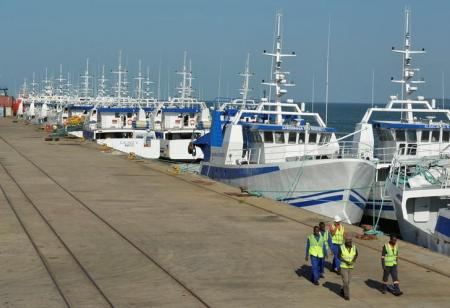
By Karin Strohecker
LONDON (Reuters) – Debt-ridden Mozambique has no chance of meeting its year-end deadline for a restructuring deal, according to investors who are preparing to dig in their heels until the country comes clear on what it owes and to whom.
The southern African country, one of the world’s poorest, has seen its currency and investor confidence collapse since April, when the International Monetary Fund halted a loan after uncovering previously undisclosed debts that had not been approved by parliament.
Mozambique says its debt position is “unsustainable”, and wants an urgent restructuring agreement with commercial creditors so a new IMF loan can be approved. Without this, the economy will face a “downward spiral” that would be hard to control, it warned.
But creditors insist there is nothing to negotiate until they see an international audit of state firms’ loans requested by the IMF and an outline of what sort of engagement the fund would envisage going forward.
“Agreeing a deal before year-end, that is a pipedream. If you stick to the conventions, the IMF will do its debt sustainability analysis that will tell you just how solvent the country is, and on this basis you can come up with a restructuring,” said bondholder Lutz Roehmeyer, director at Landesbank Berlin Investment.
“But if you don’t have those numbers, then you simply can’t do that, so that request from Mozambique is utopian,” he said.
The commercial debts at the centre of restructuring efforts comprise a $727 million Eurobond and about $1 billion in state-guaranteed loans.
Those loans, which came to light in April as borrowings from Credit Suisse and Russia’s VTB, had not been disclosed to investors who had only just participated in restructuring a bond issued by state fishery EMATUM.
S&P Global Ratings analyst Gardner Rusike says without a timely restructuring and IMF loan, it would be “a difficult 2017” for Mozambique, with external debt surpassing 100 percent of annual output.
BAKING A CAKE
Documents published by Mozambique in November show the outstanding principal of the loans as $1.132 billion and owed by two state firms, Mozambique Asset Management (MAM) and ProIndicus.
It is unclear where the money went. The MAM loan was earmarked for a fishing port which never materialised. ProIndicus planned to use the cash for maritime security. EMATUM’s tuna fishing project, too, was a fiasco with boats rusting in Maputo harbour.
But according to the IMF, the undisclosed debt – including bilateral loans contracted between 2012 and 2015 – amounts to $1.37 billion.
Meanwhile, some bondholders, including Templeton and, Greylock have formed a group. Some of the members have retained restructuring expert and former IMF official Charles Blitzer as their advisor.
Blitzer is adamant that restructuring talks can only start when Mozambique releases the results of an external audit and it becomes clear what programme has been agreed with the IMF.
“It’s like baking a cake – you need all the ingredients, and you don’t just put them in randomly, and you don’t put it in the oven until everything has been put in in the right order,” Blitzer told Reuters.
Mozambique must also commit to “intercreditor equity”, he said, referring to equal treatment for loan and bond creditors.
But bondholders say that as they have already accepted one debt swap and loan creditors must now take some pain. One fund manager told Reuters bondholders also wanted bilateral lenders to be included in burden-sharing, but that was “not on the table.”
Meanwhile, the government has already defaulted on loan payments and is unlikely to pay a nearly $60 million Eurobond coupon in January. Its legal advisor says maturity extensions, coupon reductions and even write-downs are possible.
But bondholders disagree – many note Mozambique’s energy wealth may bring substantial dollar earnings from 2021.
While final investment decisions by ENI and Anadarko on Mozambique’s LNG projects are still outstanding, its 85 trillion cubic feet of gas reserves are enough to supply Germany, Britain, France and Italy for nearly two decades.
“That is why we, and why a lot of other bondholders, want to wait and see until 2022 and negotiate then. We have got time to do that,” Landesbank Berlin’s Roehmeyer said.
(Additional reporting by Wendell Roelf in Johannesburg, editing by Larry King)